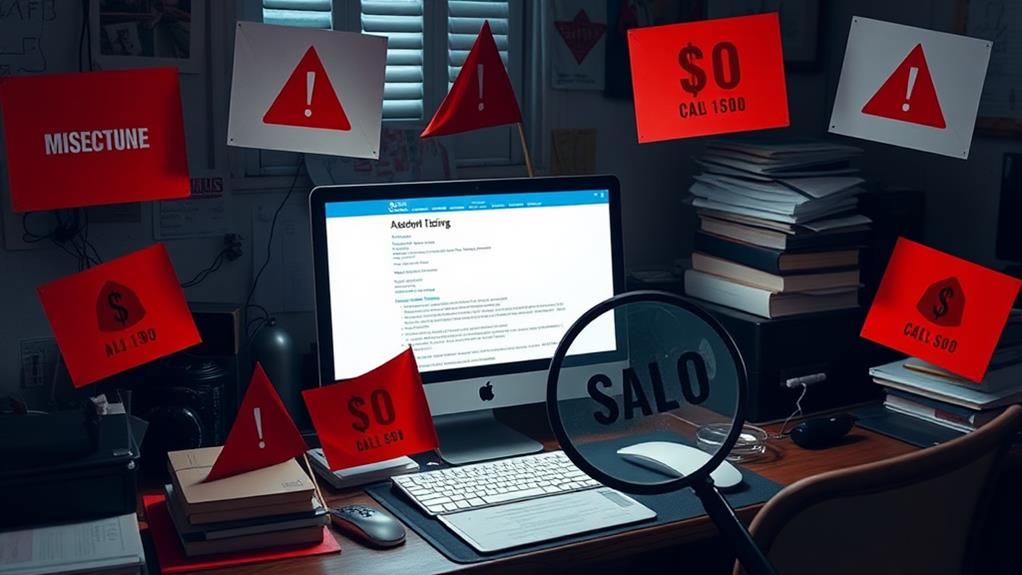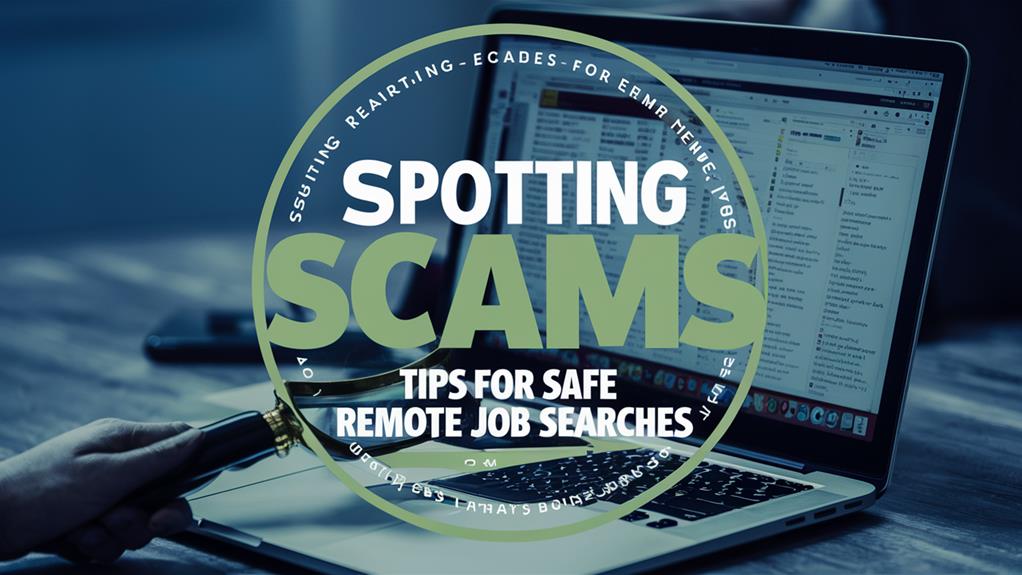To avoid scams in remote job listings, you need to stay alert for red flags. Look out for job postings that ask for upfront fees or promise unusually high pay for little work. Poor grammar and spelling mistakes often signal scams, so read carefully. Make sure to verify job offers through reputable job boards and check the company's online presence. If a job posting feels urgent or pressuring, it's likely suspicious. Trust your instincts—don't hesitate to investigate further. By following these tips, you'll protect yourself and uncover more about legitimate job opportunities ahead.
Recognizing Red Flags Quickly

When diving into remote job listings, it's crucial to be on the lookout for red flags that signal potential scams. First, be wary of job postings that ask for upfront fees for things like training or background checks. Legitimate employers won't ask you to pay anything out of pocket.
Additionally, utilizing verified job boards like legitimate job boards can help you find genuine opportunities and avoid potential scams. Next, pay attention to the quality of communication. Unprofessional communication, filled with poor grammar and misspellings, often points to scammers rather than a reputable job.
Another major red flag is the promise of unusually high pay for minimal work. If it sounds too good to be true, it probably is. Scammers often use these tempting offers to lure you in.
Additionally, watch for job listings that rush you with phrases like "immediate hires." This urgency can be a tactic to prevent you from doing your due diligence.
Trust your instincts; if something feels off, dig deeper. A legitimate job will always stand up to scrutiny. By recognizing these red flags, you can protect yourself from scams and focus on finding genuine remote work opportunities that meet your needs.
Stay alert, and you'll navigate the job market with confidence!
Recognizing Warning Signs Quickly
Scammers lurk in the shadows of remote job listings, so recognizing warning signs quickly can save you from falling victim to their traps.
Start by being cautious of job postings that promise unusually high salaries for minimal work, as these often signal potential scams. It's important to cross-check job offers against legitimate resources, such as over 3,000 remote job opportunities.
Keep an eye out for poor grammar and misspellings in job descriptions, as these are common indicators of fraudulent listings that aim to collect your personal information.
Another major warning sign is if a job listing asks for upfront fees for training or background checks. Legitimate employers never require such payments.
Also, be wary of urgent hiring language that pressures you to apply quickly; this tactic is often used by scammers to bypass your careful scrutiny.
Recognizing Red Flags Early

It's crucial to stay vigilant when exploring remote job listings, as recognizing red flags early can significantly reduce your chances of falling victim to scams.
Start by being wary of job listings that promise unusually high pay for minimal work; these offers often scream "scam." Additionally, take note of poor grammar and spelling errors in the postings. Legitimate employers typically present professional, well-written job descriptions.
Another red flag is the pressure to apply immediately or the rush to hire you. Scammers often use this tactic to push you into hasty decisions.
Also, remember that legitimate employers don't ask for upfront fees for training or background checks. If you see any requests for payment, be suspicious.
Always verify the company's legitimacy before moving forward. Check for existing complaints or reviews online, as a lack of an online presence can signal a potential scam.
Downloadable Scam Prevention Checklist
Creating a downloadable scam prevention checklist can be a game-changer in your quest for legitimate remote job opportunities. This checklist empowers you to spot red flags in job listings and take action.
Start by noting any requests for upfront fees or personal information before a formal job offer—these are common indicators of scams.
Make sure to verify job postings through reputable job boards. With reports of scams often rising, especially in remote work, it's crucial to check the employer's professional online presence. Look for a legitimate website and positive reviews on platforms like Glassdoor and the Better Business Bureau.
Secure communication is another key area; avoid unsolicited job offers from generic email addresses to protect your personal information.
Include a section in your checklist that encourages you to report any suspicious job listings to job boards and the FTC. This not only aids your safety but also helps others in the community.
Protecting Personal Financial Information

Protecting your personal financial information is crucial when navigating remote job opportunities. Be cautious about sharing sensitive information, like your Social Security number or banking details. Until you've verified the legitimacy of the employer and received a formal job offer, hold back on providing these details.
Legitimate companies typically don't ask for upfront payments for training or job-related expenses. If you encounter such requests, consider it a significant red flag.
As you apply for jobs, monitor your financial accounts for unusual activity. Scammers might exploit your information for fraudulent transactions, so stay vigilant. When submitting job applications, always use secure websites—look for "https://" in the URL—to ensure your personal financial information is transmitted safely.
If you ever receive a check from an unknown source with instructions to deposit it and send money back, don't proceed. This is a common scam tactic designed to take advantage of unsuspecting individuals.
Always take the time to verify the legitimacy of any job opportunity before disclosing your personal financial information. By following these steps, you can protect yourself and navigate the remote job market with confidence.
Career Security and Growth
Many job seekers frequently overlook the importance of career security and growth when pursuing remote work opportunities. Focusing on these aspects can help you avoid scams and find legitimate employers who value your skills.
With remote jobs becoming more popular, it's crucial to research potential employers thoroughly. Scams have surged by 54.2% from 2022 to 2023, so staying informed is vital for your safety.
Make sure to use reputable job platforms that screen listings and provide verified companies. Remember, legitimate employers won't ask for upfront fees for training or background checks. If you encounter such requests, consider it a red flag.
Investing time in understanding the remote job market can significantly enhance your career security. This means not just finding a job but also looking for opportunities that promote growth.
Seek roles where you can learn new skills and advance in your field. By being cautious and proactive, you can minimize financial risk and build a fulfilling career.
Embrace the search for remote jobs with confidence, knowing that you're equipped to identify scams and find the right path for your professional journey.
Enhanced Job Security Awareness

How can you ensure that your job search is both effective and secure in today's remote work landscape? The rise in remote work has unfortunately brought a significant increase in job scams, particularly affecting job seekers aged 18-44.
With a reported 54.2% rise in employment-related scams since COVID-19, being vigilant is crucial. Many scammers target your desire for flexible work arrangements, leading to financial risks that can average a loss of $1,995 for victims.
To protect yourself, remember that legitimate employers typically won't ask for any upfront costs or sensitive personal information before hiring. If a job listing requests these details, consider it a red flag.
Always scrutinize job postings closely, and don't hesitate to ask questions. Trust your instincts; if something feels off, it probably is.
Staying informed about current scams can significantly enhance your job security awareness. Utilize resources like the BBB Scam Tracker to keep tabs on prevalent scams.
Research Company Background Thoroughly
Thorough research into a company's background is essential for safeguarding your job search from scams. Start by verifying the company's legitimacy through their official website. Look for clear contact information and a professional design, as scammers often lack a credible online presence.
Next, check reviews and employee experiences on platforms like Glassdoor or Google. Pay attention to any complaints about unpaid wages or suspicious practices that might raise red flags.
To dig deeper, search the company's name alongside terms like "scam" or "complaint." This can help you spot warnings from previous job seekers. It's also wise to confirm the company's registration through official business directories. Legitimate companies will be properly documented and easily verifiable.
Don't forget to utilize social media. Check if the company actively engages with customers and employees. Active profiles can indicate a reputable business and help you gauge their culture.
Identify Job Posting Inconsistencies

After you've researched a company's background, it's time to scrutinize the job postings themselves for any inconsistencies. Start by comparing job titles and descriptions with industry standards. Scammers often use attractive or vague titles to lure you in. If you notice multiple grammatical errors or unusual formatting, it might indicate a lack of professionalism and legitimacy.
Next, check the contact information in the job postings against the company's website. Any discrepancies could suggest a scam. While you're at it, do a quick online search for reviews and complaints about the company. If you find little positive feedback or multiple scam reports, that's a major red flag.
Also, be cautious of job listings promising unusually high salaries for minimal work. These offers often sound too good to be true and may point to fraudulent activity.
Verify Job Posting Authenticity
To ensure the authenticity of a job posting, start by researching the company behind it. Visit the company's website and check its social media presence. Legitimate offers usually have clear and verifiable contact information, while fake job postings often lack these details.
Scammers often create listings that mimic real companies, so it's essential to cross-check the job description on reputable job boards.
Next, look for any reviews or complaints on platforms like Glassdoor. This can help you gauge the company's reputation and reveal any potential red flags. Be particularly cautious of job postings that promise unusually high salaries for minimal work, as these are often signs of scams.
You can also use online search engines to check the company name alongside keywords like "scam" or "complaint." This simple step can uncover negative reports from other job seekers that might save you time and frustration.
By taking these steps to verify job posting authenticity, you can protect yourself from falling victim to scammers and increase your chances of finding genuine remote work opportunities.
Stay vigilant and trust your instincts; if something feels off, it probably is!
Practical Application of Scam Prevention

You've done your homework on verifying job postings, but applying what you've learned is just as important. To avoid falling for remote job scams, start by confirming the legitimacy of any offer. Research the company's website, read reviews on platforms like Glassdoor, and check job postings on reputable boards.
Be wary of any job that asks for upfront fees or personal information before you're officially hired. A significant portion of scams uses these tactics, leading to substantial losses for victims.
Keep an eye out for red flags in job descriptions. Poor grammar, unrealistic salary promises, and a sense of urgency are common indicators of scams.
When communicating, always use secure methods. Trust emails from official company domains, and steer clear of unsolicited offers from generic addresses.
Lastly, regularly monitor your financial accounts for unusual activity. If you spot anything suspicious, don't hesitate to report it.
Outline Job Application Steps
When you're ready to apply for a remote job, follow these essential steps to ensure a smooth and secure process.
Start by thoroughly researching the company. Look for legitimate employers by checking their contact information, reading reviews on platforms like Glassdoor, and verifying their social media presence. This will help you distinguish genuine job listings from potential scams.
Next, make sure the job listing is posted on reputable job boards. Be cautious of listings on unofficial sites or those that lack clear branding, as these may be red flags.
When submitting your job application, always use secure websites (https://) to protect your personal information.
Avoid sharing sensitive details, like Social Security numbers, until you're confident about the employer's legitimacy. Pay attention to the language in job postings; poorly written ads or unprofessional email addresses can indicate scams.
Lastly, document all communications with potential employers and report any suspicious job postings or interactions to relevant job boards or the FTC. This helps protect others from falling victim to scams while keeping your job search safe and secure.
Check for Company Contact Details

Checking company contact details is crucial in your remote job search. Scammers often craft convincing job listings, so you need to ensure the company has a legitimate presence.
Here's how to verify the contact details:
- Visit the official website: Check for a professional email domain (like companyname.com) instead of generic ones (like Gmail or Yahoo). This is a red flag if missing.
- Confirm the physical address: Use online searches or map services to find a verifiable address. A lack of this information can signal a potential scam.
- Look for employee reviews: Websites like Glassdoor or LinkedIn can provide insights about the company through employee reviews. This can help you gauge its legitimacy.
- Check the job listing: If contact details are missing or seem unprofessional, approach the listing with skepticism. It might be a scam.
Overlooking Job Listing Details
Many remote job seekers overlook critical details in job listings, which can lead to falling for scams. Scammers often use enticing job titles and vague descriptions to attract applicants. When you read a job listing, pay attention to the specifics.
Legitimate companies provide clear details about the responsibilities and requirements of the position. If you notice excessive grammatical errors or unprofessional language, that's a big red flag.
Additionally, be wary of listings that ask for upfront fees for training or materials. A legitimate company won't ask you to pay anything before hiring you. If the listing promises immediate hires without a thorough selection process, approach it with skepticism.
Always research the company behind the job listing. If you can't find reviews or if the company has a history of complaints, it's best to steer clear. These details can help you differentiate between a legitimate position and a potential scam.
Lack of Job Verification Resources

Scammers often slip through the cracks due to a lack of accessible job verification resources, leaving job seekers vulnerable.
With job scams on the rise, it's crucial to take steps to protect yourself. Here are four tips to help you verify potential employers:
- Use Reliable Platforms: Research job listings through trusted sites like Glassdoor or the Better Business Bureau. They can help you find reviews and ratings of companies.
- Verify Contact Information: Always double-check the contact details of the employer. Scammers know how to create fake websites that resemble legitimate companies. Conduct independent searches to confirm their authenticity.
- Look for a Professional Online Presence: Legitimate employers usually maintain active social media profiles and detailed websites. If you can't find any information, it could be a red flag.
- Be Cautious with Remote Work Offers: With 80% of adults preferring flexible work, scammers are taking advantage. Always ensure you're dealing with reputable companies before applying.
Utilize Job Verification Services
Utilizing job verification services can significantly enhance your job search, steering you away from fraudulent postings. These services filter out scams by providing vetted remote job listings from reputable employers. Platforms like FlexJobs and Virtual Vocations offer subscriptions that grant you access to curated opportunities, drastically reducing the risk of falling for scams.
Many job verification services conduct thorough research on companies and their job offers. This means you can trust that the listings you see are legitimate. By relying on verified job platforms, you can avoid the pitfalls of unsolicited offers and fake postings often found on standard job boards.
Subscribing to these trusted platforms not only helps you find genuine job opportunities but also provides access to valuable resources. You might benefit from career coaching and skills assessments, enhancing your overall job search experience.
In a world where scams are prevalent, job verification services empower job seekers like you to navigate the remote job market with confidence. By taking this proactive step, you'll be well on your way to finding a rewarding position without the fear of fraudulent postings.
Summarize Key Scam Prevention Tips

When searching for remote job opportunities, it's crucial to stay vigilant against potential scams. Here are some key tips to help you protect yourself:
- Verify Legitimacy: Always research a company's website, check reviews on platforms like Glassdoor, and confirm job postings through reputable job boards before sharing any personal information.
- Watch for Upfront Fees: Be wary of job offers that require upfront fees for training or equipment. Legitimate employers won't ask for money during the hiring process.
- Identify Red Flags: Look out for suspicious job offers, such as poorly written descriptions, unusually high pay for minimal work, or urgent hiring requests that pressure you to decide quickly.
- Protect Your Privacy: Safeguard your sensitive information. Never provide details like your Social Security number or banking information until you've confirmed the employer's legitimacy. Always use secure websites for applications—look for "https://".
If you encounter suspicious job postings, make sure to report scams to relevant job boards, the Federal Trade Commission (FTC), and local consumer protection agencies.
Identify Job Posting Inconsistencies
Identifying job posting inconsistencies is essential for protecting yourself from scams. Start by examining the job title and description. If you find discrepancies or vague responsibilities, it could indicate a lack of legitimacy.
Legitimate companies maintain a professional standard, so be cautious of postings filled with grammatical errors or awkward phrasing.
Next, check for official company information. A credible listing should come from a professional email domain and a valid website. If you notice generic email addresses or an absence of an online presence, it's a red flag for job scams.
Research the company's reputation by looking for reviews and complaints. If the company has little visibility or numerous negative reports, it's wise to proceed with caution.
Explore Trusted Job Boards

Finding a reliable job board can significantly enhance your remote job search experience. By choosing trusted job boards, you'll reduce the chances of falling victim to scams and encountering fraudulent job postings.
Here are four reasons to explore these platforms:
- Vetted Listings: Trusted job boards like FlexJobs and Virtual Vocations carefully vet job postings to ensure they come from legitimate employers.
- User Reviews: Many platforms feature user reviews and ratings, giving you insight into the experiences of other job seekers.
- Scam Reporting: Reputable job boards have clear policies against scams and allow you to report suspicious postings, helping keep the community safe.
- Advanced Filters: These platforms often use advanced filters to identify and remove fraudulent listings, making your search more secure.
Conclusion
By staying alert and informed, you can easily navigate the remote job market and avoid scams. Remember, legitimate opportunities will ask for your skills, not your personal information upfront. Trust your instincts and utilize resources that verify job postings. With the right tools and knowledge, you can confidently pursue your dream job while protecting yourself. Embrace the journey ahead, and let each step bring you closer to a rewarding remote career. You've got this!

Leave a Reply